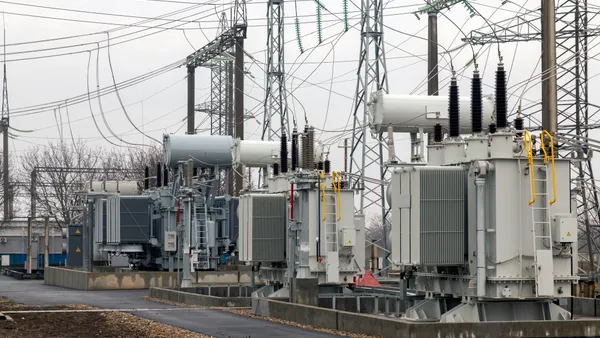Dive Brief:
- Exelon, environmental advocates and the New York Public Service Commission filed briefs last week at the Federal Energy Regulatory Commission defending the state's Zero Energy Credit plan to save nuclear generation.
- The Electric Power Supply Association filed two briefs requesting federal regulators to take action against the proposed nuclear credits, arguing they intrude on federal jurisdiction of wholesale markets.
- The Environmental Defense Fund also joined the fray and argued the nuclear supports are needed to help the state meet environmental goals, while Exelon and the PSC say the credits are no different than more commonly-used Renewable Energy Credits.
Dive Insight:
Debate continues over whether New York's proposed nuclear supports intrude into federal wholesale markets, with the primary argument being the Zero Energy Credits are functionally no different than renewable credits that are widely accepted.
"The principles establishing that RECs fall within state jurisdiction do not turn their pricing mechanism, whether market-based or administrative," Exelon said in its reply. And the utility argued RECs and ZECs are “separate commodities from … capacity and energy,” citing case law precendents. The credits value the environmental attributes rather than the energy, the company said.
"New York thus was acting within its sphere. And in that sphere, administrative price-setting, based on the social cost of carbon, is a reasonable policy choice," Exelon argued.
Last year, as several nuclear plants faced market difficulties and signaled they were considering shutting down, New York regulators approved aggressive rules calling for 50% renewable energy and included nuclear credits to keep the plants open.
The Fitzpatrick, Ginna and Nine Mile nuclear plants are expected to produce 27.6 million MWh of carbon-free generation per year, and Gov. Andrew Cuomo (D) has set a goal of cutting greenhouse gas emissions 40% from 1990 levels by 2030, and 80% by 2050. Exelon owns all of them plants, and its purchase of Entergy's FitzPatrick plant was contingent on the state's ZEC proposal.
The Public Service Commission also filed comments with FERC, defending the credit program. "New York nowhere decided that NY ISO auction prices were inadequate compensation for sales in those markets," regulators told FERC. "And it did not condition ZEC payment on auction sales."
Environmental Defense Fund's filing focused on the need for the nuclear credits, as opposed to their legality. "The underlying environmental impetus behind the state policy response is vital, scientifically based, and urgent," the group said.













